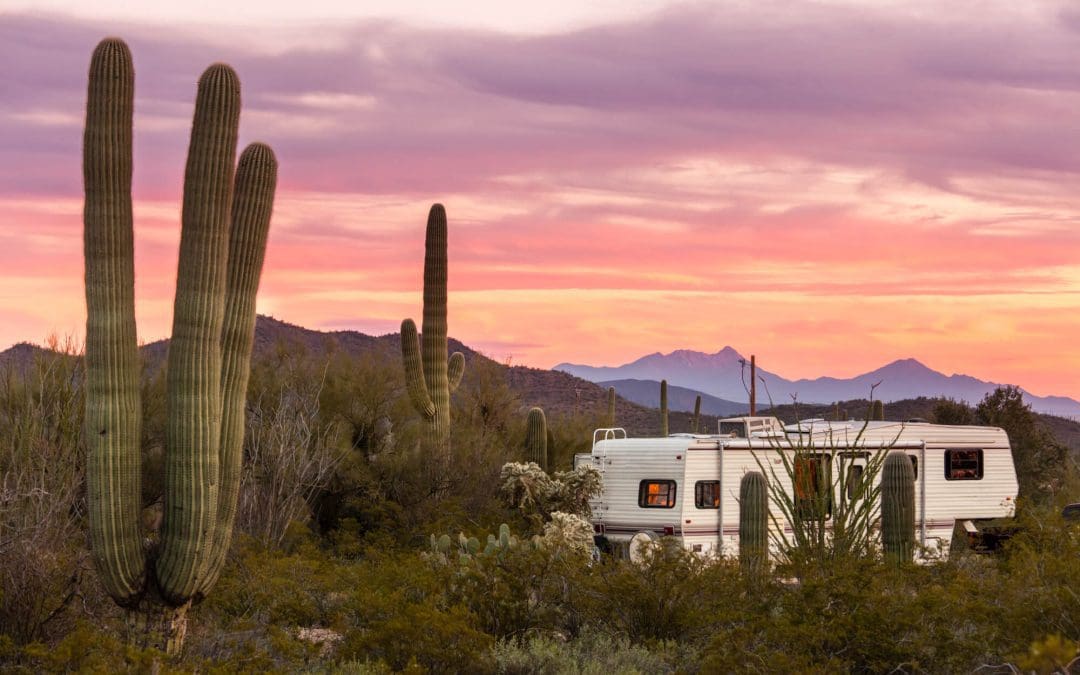Boondocking, or dry camping, offers RV enthusiasts the unique opportunity to immerse themselves in nature, away from crowded campgrounds and the hustle and bustle of urban life. However, boondocking your RV requires planning and resourcefulness for a comfortable and enjoyable experience. Here are some essential tips to make your boondocking adventure a success.
Research and Scout Your Locations When Boondocking Your RV
Before setting out, research potential boondocking sites. Look for public lands such as Bureau of Land Management (BLM) areas, national forests, and other dispersed camping spots. Websites and apps dedicated to RV boondocking can provide valuable information about available locations, including user reviews and site amenities.
Conserve Water and Power
Water and power are precious commodities when boondocking. To make the most of your resources, practice water conservation by taking shorter showers, using biodegradable wipes for quick cleanups, and washing dishes efficiently. Consider installing a water filtration system to use water from natural sources safely.
For power, invest in solar panels or a portable generator. Solar panels are eco-friendly and can keep your batteries charged without the noise and fumes of a generator. Monitor your power usage and prioritize essential appliances to avoid draining your batteries.
Manage Waste Responsibly When Boondocking Your RV
Proper waste management is crucial for maintaining the pristine nature of boondocking sites. Use a portable waste tank for your black and gray water, and empty it at designated dump stations. Bring sturdy, sealable bags for trash and pack out everything you bring in. Leave no trace to preserve the environment for future campers.
Stay Connected and Safe
Even though boondocking often means disconnecting from the digital world, staying informed and safe is essential. Carry a reliable map and a GPS device, as cell service can be spotty in remote areas. Let someone know your plans and expected return time. Familiarize yourself with local wildlife and weather conditions to avoid any surprises.
Be Prepared for Emergencies When Boondocking Your RV
An emergency kit is a must-have for any boondocking trip. Stock it with first aid supplies, essential tools, extra food and water, and necessary medications. A portable fire extinguisher, flashlight, and multi-tool are also essential items. Being prepared ensures you can handle any unexpected situations that may arise.
Respect Nature and Fellow Campers
Boondocking offers a chance to connect with nature, so respecting the environment and other campers is important. Keep noise levels down, especially if you’re using a generator. Avoid disturbing wildlife, and follow all fire regulations to prevent wildfires. Be mindful of your impact and strive to leave your campsite better than you found it.
Plan for Self-Sufficiency
Boondocking means being self-sufficient. Plan your meals and bring non-perishable food items. Ensure your RV is in good working condition, with all systems checked and maintained. Carry extra fuel, spare tires, and essential repair tools. The more prepared you are, the smoother your boondocking experience will be.
Enjoy the Experience
Finally, remember to enjoy the experience. Boondocking allows you to explore beautiful, remote locations and enjoy the tranquility of nature. Take the time to hike, stargaze, and immerse yourself in the serenity of your surroundings. Embrace the freedom and adventure boondocking offers, and make lasting memories on the open road.
By following these tips, you can make the most of your boondocking adventure and have a safe, enjoyable, and environmentally responsible experience.
FAQs for Boondocking Your RV
What types of RVs are best suited for boondocking?
Most RVs can be adapted for boondocking, but smaller, more self-contained models with robust solar setups, larger water tanks, and efficient energy systems tend to perform better in remote locations.
What are some tips for generating power while boondocking?
Investing in solar panels and a portable generator can help keep your RV powered. Additionally, using energy-efficient appliances and monitoring your power consumption are key strategies for maintaining adequate power levels.
What should I do if I encounter wildlife while boondocking?
Maintain a safe distance, store food securely, and avoid leaving any food scraps or garbage around your campsite. Familiarize yourself with the behavior of local wildlife and follow guidelines to prevent encounters.
How can I minimize my environmental impact while boondocking?
Practice “Leave No Trace” principles by packing out all trash, respecting wildlife, using biodegradable products, and avoiding disturbing the natural surroundings. Ensuring your campsite is left as you found it helps preserve these areas for future campers.
Blue Ribbon RV Inspection offers RV inspections and services to customers in Arizona. Contact us to schedule an appointment.

